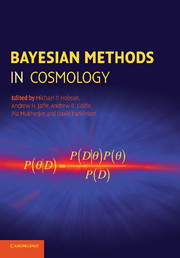Book contents
- Frontmatter
- Contents
- List of contributors
- Preface
- Part I Methods
- Part II Applications
- 7 Bayesian source extraction
- 8 Flux measurement
- 9 Gravitational wave astronomy
- 10 Bayesian analysis of cosmic microwave background data
- 11 Bayesian multilevel modelling of cosmological populations
- 12 A Bayesian approach to galaxy evolution studies
- 13 Photometric redshift estimation: methods and applications
- Index
7 - Bayesian source extraction
Published online by Cambridge University Press: 11 April 2011
- Frontmatter
- Contents
- List of contributors
- Preface
- Part I Methods
- Part II Applications
- 7 Bayesian source extraction
- 8 Flux measurement
- 9 Gravitational wave astronomy
- 10 Bayesian analysis of cosmic microwave background data
- 11 Bayesian multilevel modelling of cosmological populations
- 12 A Bayesian approach to galaxy evolution studies
- 13 Photometric redshift estimation: methods and applications
- Index
Summary
Source extraction is a generic problem in modern observational astrophysics and cosmology. Indeed, one of the major challenges in the analysis of astronomical observations is to identify and characterize a localized signal immersed in some general background. Typical one-dimensional examples include the extraction of point or extended sources from time-ordered scan data or the detection of absorption or emission lines in quasar spectra. In two dimensions, one often wishes to detect point or extended sources in astrophysical images that are dominated either by instrumental noise or contaminating diffuse emission. Similarly, in three dimensions, one might wish to detect galaxy clusters in large-scale structure surveys. Moreover, the ability to perform source extraction with reliable, automated methods has become vital with the advent of modern large-area surveys too large to be inspected in detail ‘by eye’. Indeed, much of the science derived from the study of astronomical sources, or from the background in which they are immersed, proceeds directly from accurate source extraction.
In extracting sources from astronomical data, we typically face a number of challenges. Firstly, there is instrumental noise. Nonetheless, it is often possible to obtain an accurate statistical characterization of the instrumental noise, which can then be used to compensate for its effects to some extent. More problematic are any so-called ‘backgrounds’ to the observation. These can be astrophysical or cosmological in origin, such as Galactic emission, cosmological backgrounds, faint source confusion, or even simply emission from parts of the telescope itself.
- Type
- Chapter
- Information
- Bayesian Methods in Cosmology , pp. 167 - 192Publisher: Cambridge University PressPrint publication year: 2009
- 2
- Cited by



